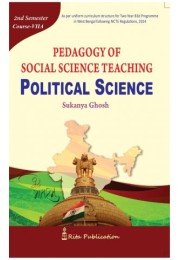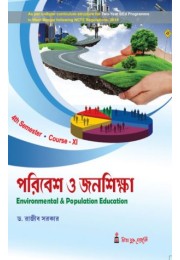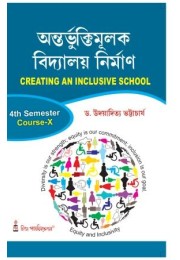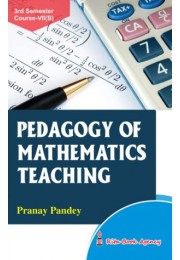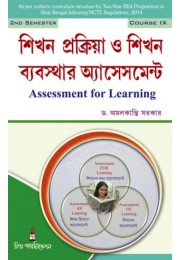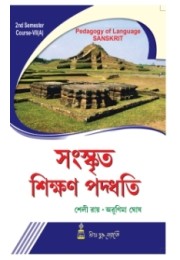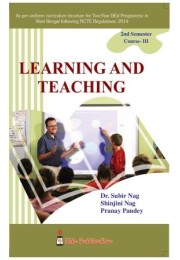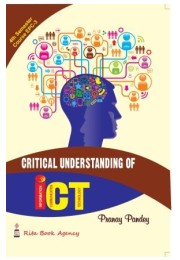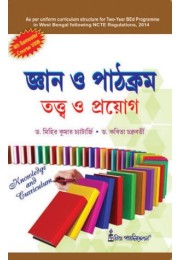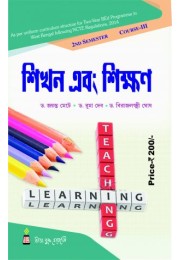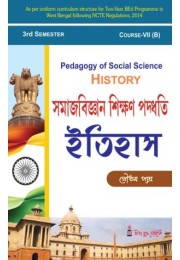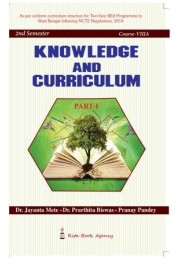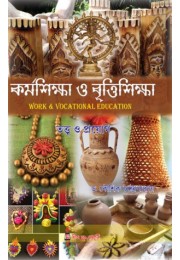BISOYKHETRA O BISOYER ANUDHABON (CC-5)
Rs.320.00 Rs.304.00
* In case the book price changed by the Publisher due to new edition, We will contact you and confirm regarding the revised price before processing the order !
Author: DR.MADHUMALA SENGUPTA,DR.PINTU MAJI,CHANDRIMA MITRA
Availability: In Stock
Publisher: Rita Publication
Contents
1. Discipline and Subject
Introduction 1
1.1. Education as interdisciplinary field of study
1.2. Nature and characteristics of discipline
1.2.1. Classification of disciplines
1.2.2. History of development of disciplines
1.2.3. Nature of Discipline
1.2.4. Paradigm Shift in the Nature of Disciplines -Paradigms —Paradigm shift —Paradigm Shift in the Discipline of Education —Challenges to Implement Paradigm Shift in Education
1.2.5. Characteristics of Discipline
Disciplines and School Subjects
1.3.Emergence of Various Disciplines from
Education
1.4. Merger of Various Disciplines into Education
1.5. Interrelation and Interdependence amongst Various School Subjects
Questions
2. Science as a Subject and Discipline
2.1. Nature and History of teaching Science
Nature of Science —Basic assumptions of Science – philosophy of science –History of Science —History of Science in India
2.2. Scientific Method, a critical view
2.3. Knowledge, understanding and science
2.4. The socio-cultural perspective and the ethical consideration —Ethical consideration
2.5. Science as a discipline, place of scientific knowledge in the schema of school curriculum
2.6. Study of emergence of school science in relation to the social, political and intellectual and historical context
2.7. Curriculum syllabus and textbooks; the paradigm shifts in the discipline, the changing notion of scientific knowledge and the need to redefine school science
Questions
3. Language as a Subject and Discipline
3.1. Centrality of Language in Education 65
Education —Language —Language and Education —Language as a Rule-Governed System —Language, Literature, Aesthetics —Language, Society, Culture and Thought —Language and Identity —Language and Power —Language and Gender —Language, Attitudes and Motivation
3.2.Role of Language in Children’s Intellectual Development and Learning
The Child’s Language —Language Learning —Role of Language in Children’s Intellectual Development —Piaget’s view on Langugage Development —Vygotsky’s view on Language Development
3.3. Policy Issues and Language at School
Recommendations of different commissions and National Policies in Post Independent India : A historical perspective Radhakrishnan Commission (1948) —Mudalior Commisssion (1952-53) —Kothari commisson (1964-66) —The National Policy on Education (1968) —National Policy on Education (1986)
3.4. Language as a Medium of Communication
Understanding Communication —Human communication and Language —Communication as information-transfer: Role of Language —Communication for interaction: The Role of language —Critical Theory of Communication: The Role of Language
3.5. Language in the school curriculum
Aims of Teaching Languages —1. Multilingualism is to be used as a resource in a language classroom —2. Language across the Curriculum —3. An Integration of language skills, creativity and sensitivity —Language Issues and Debates —Majority Languages and Minority Language —Hindi as the National Language —The medium of instruction
3.6. Phases of language development
4. Mathematics as a Subject and
Discipline
4.1. Nature and History of teaching Mathematics
Nature and Characteristics of Mathematics—History of Mathematics—History of Mathematics in India
4.2. Place of Mathematics in school Curriculum
The vision of teaching mathematics in school
4.3. Mathematics in Day-to-day Life
4.4. Relationship of Mathematics with Other Subjects—Application of mathematics in society and technology—The teaching of mathematics in school in the present context—The qualities of a successful mathematics teacher
5. Social Science as a Subject and
Discipline
Introduction
5.1. Nature and Philosophy of Social Science
Social Science and Social Studies—The scope of Social Sciences—History of Social Science—Philosophy of Social Science
5.2. Social Science as an Area of Study
Teaching the Social Sciences (NCERT)—Primary Stage—Upper Primary Stage—Secondary Stage—Higher Secondary Stage
5.3. Need of Studying Social Science through Inter-disciplinary Perspectives
5.4. Place and Relevance of Social Science in School Curriculum
The Importance of Studying Social Science in School
Practicum
Sample Questions




